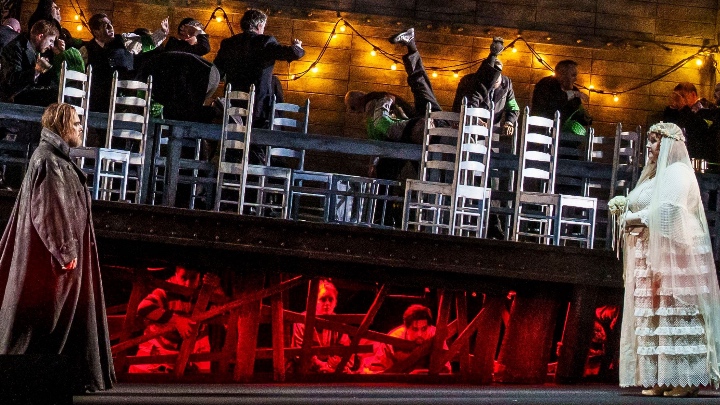Lyric Opera of Chicago opened its new season on Saturday night with a new-to-Chicago production of Wagner’s first masterpiece The Flying Dutchman. The production features fine singing by a first-rate cast, remarkable work from the chorus, interesting set and costumes, all of which serve Wagner’s supernatural tale of obsessive love very well. Unfortunately, they are surrounded by a Christopher Alden production that can be described in one word: neurotic.
Now, of course, these characters are written to be neurotic/ obsessed, especially Senta and the Dutchman. But Alden doubles and triples down on this behavior, with characters asked to display their neuroses to the point of near insanity. I kept thinking to myself that this production would work very well if set in an asylum.
We begin with Senta staring up at a Munch-ish portrait, presumed to be her vision of the Dutchman. The Steersman sings his lovely aria, then wanders about the stage throughout the rest of the opera. He recoils in horror each time he sees the Dutchman (the only character to do so) as if facing Count Dracula himself. The Dutchman enters for his scena “Die Frist ist Um,” and expresses his mental and spiritual anguish physically, clutching at his chest and playing some of the scene lying prone on the stage, and on the final note he mimes strangling himself with the ship’s ropes. Senta, looking frumpish in an orange wig, sits in a chair staring at the Dutchman’s portrait, physically shoving anyone who tries to touch it.
In this production, the character of Mary, the overseer of the spinning women, becomes “the keeper of the portrait,” hanging it and re-hanging it or carrying it on display. Finally we meet poor Erik, who enters with a long hunting rifle, with which he threatens murder or suicide and emotes wildly over his unrequited passion for Senta. And, of course, we assume he’s eventually going to use it. In an ending that completely ignores Senta’s romantic self-sacrifice, she holds the portrait up to Erik, who shoots through it, killing her. Instead of following the story, we in the audience spend most of the evening thinking “What?? Why is that happening?”
Happily, the fine singing actors of this remarkable cast overcome these directorial miscues. Tomasz Konieczny, such a splendid Wozzeck at Lyric a few years ago, is a bit barky in “Die Frist ist Um” but warms into his smooth bass-baritone, especially moving in his love scenes with Senta. His is a powerful stage presence and he brings powerful emotion to the role.
Equally impressive is the excellent soprano Tamara Wilson as Senta, tossing her potent high notes with beauty and ease. She is an unusually forceful Senta, taking no prisoners in her obsession with The Dutchman. Her “Senta’s Ballad” is a model of beautifully shaped phrases forming a cohesive whole. Finnish bass Mika Kares sings a potent and smooth-voiced Daland, making his greedy nature clear without overplaying or going for cheap laughs. Robert Watson brings a lovely tenor to the role of Erik, but is somewhat defeated by the overwrought acting he is being asked to perform. Only Melody Wilson’s underpowered Mary did not provide the necessary vocal beauty. Ryan Capozzo was a sweet-voiced Steersman.
Both the men and the women of the Lyric Opera Chorus sang and acted thrillingly, with poise and precision, and they performed the elaborate choreography with the same. (No choreographer is listed in the program). After a few glitches in the beginning of the overture and some overly muted brass, the Lyric Opera Orchestrabrought much life to Wagner’s intense score. Conductor Enrique Mazzola is new to Wagner, and it showed in a few places. I thought the overture alternately too slow or too fast, but later his conducting and work with the singers was excellent.
Allen Moyer’s serviceable set lent itself to quick scene changes, and his costumes were appropriate except for the Dutchman’s prison uniform that we see when he takes off his coat. Does Alden mean this as a Holocaust reference as he cites in his Program note? Ann Militello’s lighting helped sustain the mood of various scenes and worked well.
All in all, it was a very successful musical evening, and the singers were greeted with well-deserved ovations at the curtain call. Unfortunately, the confusing production obscured Wagner’s themes and failed to make cogent storytelling.
Photos: Todd Rosenberg




